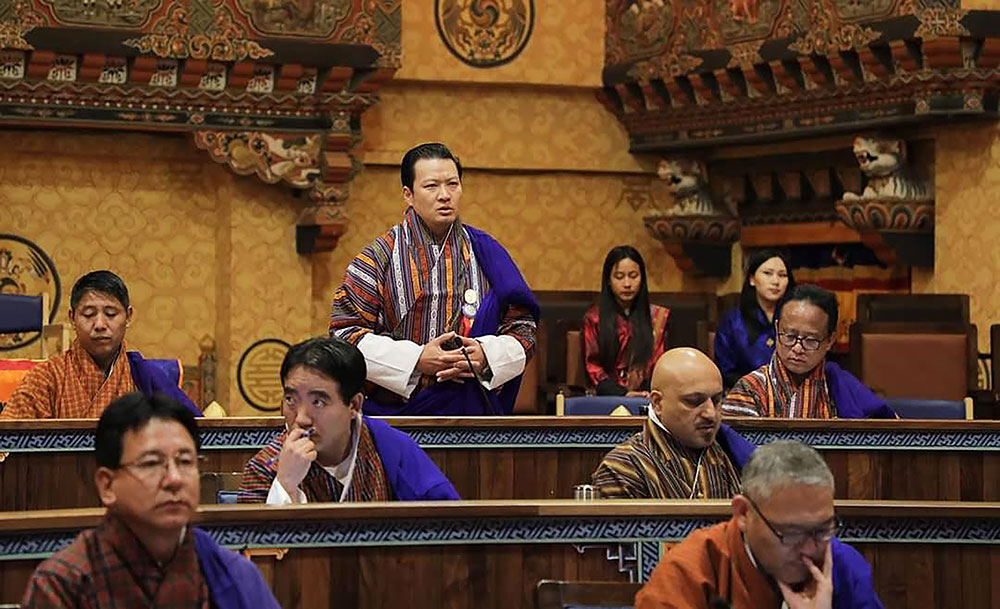Thinley Namgay
The majority of MPs in the National Council (NC) yesterday supported the Alternative Dispute Resolution (Amendment) Bill of Bhutan 2024, endorsing 157 of the 159 amended provisions and three of the four new provisions.
NC’s Legislative Committee (LC) reviewed the Alternative Dispute Resolution (ADR) Act of Bhutan 2013 and proposed amendments to 159 of 182 provisions, retained 23 provisions, and introduced four new provisions in the ADR (Amendment) Bill of Bhutan 2024.
ADR refers to the use of methods such as mediation or arbitration to resolve disputes without resorting to litigation. Currently, the Bhutan ADR Centre (BADRC) is located at Changzamtog, Thimphu.
Introducing the ADR (Amendment) Bill of Bhutan 2024, LC Chairperson Pema Tashi, said that it was necessary to address challenges affecting arbitration in Bhutan, streamline processes, ensure arbitrator competence, and minimise judicial reviews.
He said the ADR (Amendment) Bill of Bhutan 2024 would help position Bhutan as a trusted international arbitration hub by aligning its framework with the UNCITRAL Model Law on International Commercial Arbitration. He added that international investors would trust the country’s ADR system.
The four new provisions include Chapter 1, Section 21(A), which requires the government to provide adequate financial support for the sustainable operation of the ADR Centre and Chapter 3, Section 44(A), mandating that all domestic arbitrations be conducted by the ADR Centre of Bhutan in accordance with the Act.
In addition, Chapter 8, Section 134(A), requires the ADR Centre to scrutinise draft awards prior to issuance, with its opinion to be considered by arbitrators and Chapter 10, Section 151(A), which allows appeals against awards in domestic arbitration.
However, the MPs raised concerns regarding Section 5, Section 14, and the new provision in Section 21.
The NC Chairperson, Sangay Dorji, directed the Committee to revisit these three provisions in consultation with the members who raised the concerns. The final Bill is scheduled to be adopted on December 6.
Section 5 adresses the Administration of the ADR Centre. In the 2013 ADR Act of Bhutan, the ADR Centre was headed by the Chief Administrator. However, the LC proposed amending this position to Secretary General.
The LC Chairperson clarified to the members that the term Secretary General is more applicable for the head of the ADR Centre considering the global scenario. He added that the term Chief Administrator is similar to a civil service position.
Section 14 of the 2013 ADR Act of Bhutan states that the Chief Administrator and the employees who are civil servants must resign from the civil service upon appointment to the ADR Centre. However, the LC only amended the term Chief Administrator to Secretary General, retaining the meaning of the section.
Some members also expressed that the Section 14 needs further discussion as the ADR Centre is still in its early stage and is not in a position to maintain its own human resources due to budget constraints.
“So far, the government has been providing human resources to the centre. If we mandate people to resign from their government jobs to join the ADR Centre, it would further discourage people from joining,” a member said.
The LC’s new proposed Section 21(A) states that the government shall make adequate financial provisions for the sustainable operation of the centre.
A new section, on financial support from the government, Trashigang’s NC Member, Sonam Tobgyel, said the ADR Centre is supposed to be independent, but financial assistance from the government could question its independence.
The LC Chairperson, said the ADR Centre is not financially strong at present, and financial support from the government for the time being is the only viable solution to address the issue.
During the deliberations, the MPs shared concerns about the lack of independence, transparency, and accountability of the ADR Centre. Members said that the head of the ADR Centre is still appointed by the National Judicial Commission.
Members also said that people still believe that the ADR Centre is only meant for contractors. “This needs to be addressed as it belongs to all,” a member said.
Suggestions were also made to require the head of the ADR Centre to have at least a Master’s Degree, establish an ADR Centre board, and recruit staff from diverse backgrounds to ensure equal job opportunities for all.
One of the amendments was in Section 57. In the 2013 ADR Act of Bhutan, it stated that upon appointment of arbitrators by the parties, if the arbitrators do not communicate with the parties regarding the appointment of the presiding arbitrator within 30 working days of their appointment, the centre shall, upon request by a party, appoint the presiding arbitrator.
While in the proposed amendment, the number of days has been reduced to 15 to ensure timely services.
Many Bhutanese are unaware of the Bhutan ADR Centre despite the existence of an arbitration framework. There is also minimal interaction and collaboration between the courts and the ADR Centre.
Since its establishment in 2018 under the Alternative Dispute Resolution Act of Bhutan 2013, the ADR Centre has managed over 277 cases, primarily involving public contract disputes, with total claims exceeding Nu 5 Billion.


